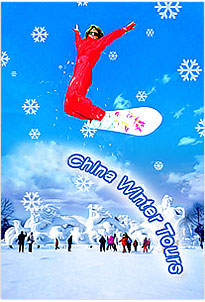- Home Page
- Fact Tours
Our sample tour itineraries of China and China travel packages are sorted by theme and available at competitive prices, you can browse what tours are right for you for your trip to China.
Popular China Tour Packages

Custom Tour Packages to China and Ask Our Experts for Free Enquiry !
- Coach Tours
- Destinations
Beijing, the capital of China. Its art treasures and universities have long made it a center of culture and art in China.
Beijing Top Attractions
Beijing City Tours
Best China Tours with Beijing
Shanghai, the cultural and economic center of East Asia. It renowned for its historical landmarks, the extensive and growing skyline.
Shanghai Top Attractions
Shanghai City Tours
Best China Tours with Shanghai
Xi'an, having held the position under several of the most important dynasties. It is the top destination to explore the facts of Chinese history.
Xi'an Top Attractions
Xi'an City Tours
Best China Tours with Xi'an
Huangshan boasts its culture, beautiful rivers, villages and mountains. It's home to 2 UNESCO World Heritage Sites and the Mecca of photographers.
Huangshan Top Attractions
Huangshan City Tours
Best China Tours with Huangshan
Sichuan is the cradle of the Shu culture, panda, mahjong, teahouse and spicy food. The province ranks first in China by number of UNESCO World Heritage Sites. It is called "the Heaven of Abundance".
Sichuan Top Attractions
Sichuan Tour Packages
Best China Tours with Sichuan
Yunnan, literally means the south of colorful clouds, due to its beautiful landscapes, mild climate and diverse ethnic cultures and traditions, is one of China's major tourist destinations.
Yunnan Top Attractions
Tibet, the nearest land to the sky, is known for its breathtaking landscape, splendid culture, art, buildings, and mysterious religions.
Tibet Top Attractions
Tibet Tour Packages
Best China Tours with Tibet
Explore the lost civilizations by riding a camel! Travel across the Gobi and the desert, and over the high mountains. Our Silk Road tours including different sections of the Silk Road in China.
Silk Road Top Attractions
Silk Road Tour Packages
Best China Tours with Silk Road
Guilin, an internationally-known historical and cultural city, has long been renowned for its unique karst scenery. Its vicinities are the paradise of hiking, caving, rafting, biking and countryside exploring.
Guilin Top Attractions
- China Facts
- China Hotels
- Travel Photos
Dunhuang
Dunhuang is a city in Jiuquan, Gansu province, China. It is sited in an oasis.
History
Dunhuang was made a prefecture in 117 BC by Emperor Han Wudi, and was a major point of interchange between ancient China and Central Asia during the Han and Tang dynasties. Located in the western end of the Hexi Corridor near the historic junction of the Northern and Southern Silk Roads, it was a town of military importance. Its name is mentioned as part of the homeland of the Yuezhi or "Rouzhi" (nomadic people living in the Western Regions during the Han Dynasty ) in the Shiji (The Book of History), but this mention has also been identified with an unrelated toponym, Dunhong.
Early Buddhist monks accessed Dunhuang via the ancient Northern Silk Road, the northernmost route of about 2,600 kilometres (1,600 mi) in length, which connected the ancient Chinese capital of Xi'an to the West over the Wushao Ling Pass to Wuwei and emerging in Kashgar. For centuries Buddhist monks at Dunhuang collected scriptures from the West, and many pilgrims passed through the area, painting murals inside the Mogao Caves or "Caves of a Thousand Buddhas." A small number of Christian artifacts have also been found in the caves (see Jesus Sutras), testimony to the wide variety of people who made their way along the silk road. Today, the site is an important tourist attraction and the subject of an ongoing archaeological project. A large number of manuscripts and artifacts retrieved at Dunhuang have been digitized and made publicly available via the International Dunhuang Project. Edges of the city are threatened with being engulfed by the expansion of the Kumtag Desert, which is resulting from longstanding overgrazing of surrounding lands.
Climate
Dunhuang is landlocked, and, surrounded by high mountains, has an arid, continental climate. The annual average temperature is 9.3 °C (48.7 °F), but ranges from 24.7 °C (76.5 °F) in July to - 9.3 °C (15 °F) in January. Dunhuang is extremely hot in summer and bitterly cold in winter. Only a marginal amount of precipitation falls, and even that is quickly dried by evaporation
Dunhuang City Center
Dunhuang's city centre is relatively highly developed, including much commercial activity and many hotels. Bookshops and other souvenir shops sell materials relating to the Caves and the history of the region. The Dunhuang County Museum contains a number of Chinese and Tibetan items such as manuscripts, paintings, coins and statues. The Dong Dajie night market is held in the city centre, popular with tourists. Many souvenir items are sold, including such typical items as jade, jewelry, scrolls, hangings, small sculptures, and the like. A sizable number of members of China's ethnic minorities engage in business at these markets. A Central Asian dessert or sweet is also sold, consisting of a large, sweet confection made with nuts and dried fruit, sliced into the portion desired by the customer.
Nearby Attractions
Crescent Lake and Echoing-Sand Mountain (Mingsha Shan)
These attractions are essentially part of the same area. The lake is an oasis surrounded by high sand dunes. The Mingsha Shan is so named for the sound of the wind whipping off the dunes, the singing sand phenomenon. The area is very popular with tourists, the great majority of them Chinese. A street lined with souvenir stalls leads up to the entrance to the complex. Most tourists ride camels, organized by the complex operators, to reach the sand dunes. Typically the camels are guided by local camel guides, who include both women and men. At the dunes, a popular activity for tourists is to ride sleds down the sand slopes, much like snow-sledding during winter in temperate zones. Alongside Crescent Lake is a pagoda in traditional Han Chinese architecture.
Questions & Comments
Home | About Us | Partnerships | Terms & Conditions | Privacy & Security | Payment Guide | Resource Links| Sitemap
Email: contact@chinafacttours.com, Tel: +86-773-3810160, Fax: (+86) 773-3810333
Copyright © 2008-2020 China Fact Tours. All rights reserved
![]()











